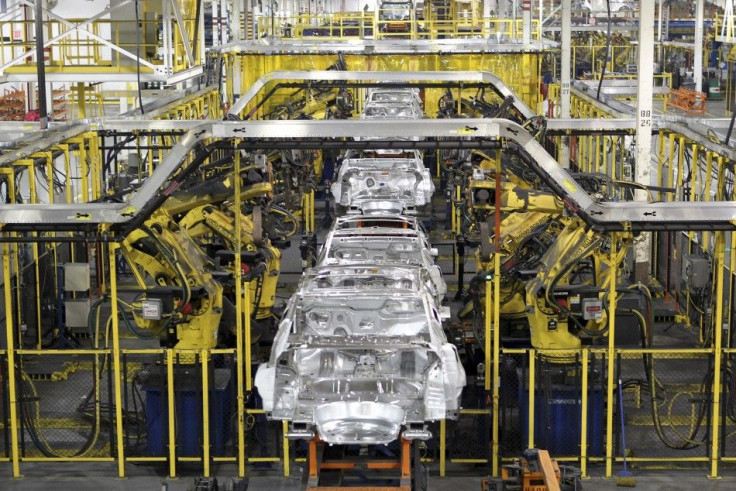U.S. Factory Sector's Expansion In August Eases Imminent Recession Concern
ANALYSIS

Paraphrasing the late, great writer Mark Twain, the reports of the U.S. manufacturing sector's death are greatly exaggerated -- the nation's factory sector unexpectedly expanded in August, easing concern that the U.S. economy is headed for another recession: the Institute for Supply Management's manufacturing index dipped to 50.6 in August from 50.9 in July.
Readings above 50 indicate an expansion; under 50, a contraction. A Bloomberg survey had expected the manufacturing index to fall to 48.5 in August; the index was at 55.3 in June, 53.5 in May, and 60.4 in April. It was the 25th consecutive month of expansion for the nation's manufacturing sector.
Two of Three Key Index Components Also Rise
In August, the closely-watched new orders component -- a measure of future demand - rose to 49.6 from 49.2 in July. The inventories component jumped to 52.3 from 49.3.
The employment component did fall to 51.8 from 53.5 in August but it's still at a rate that indicatesmanufacturing companies are hiring, just at a slower pace.
Catch-Phase Is Caution
Norbert J. Ore, chairman of the ISM's Manufacturing Business Survey Committee, said August's report shows a manufacturing sector that's still expanding, but caution is the catch-phrase among manufacturers, given the slow-growth U.S. economy.
The PMI registered 50.6 percent, a decrease of 0.3 percentage point from July, indicating expansion in the manufacturing sector for the 25th consecutive month, at a slightly slower rate. The Production Index registered 48.6 percent, indicating contraction for the first time since May of 2009, when it registered 45 percent, Ore said, in a statement. The New Orders and Backlog of Orders Indexes edged up slightly from July, but both indexes are indicating contraction in August at slower rates than in July. The rate of increase in prices slowed for the fourth consecutive month, dropping another 3.5 percentage points in August to 55.5 percent. The overall sentiment is one of concern and caution over the domestic and international economic environment, which is affecting customers' confidence and willingness to place orders, at least in the short term.
Respondents' Comments
Respondents' comments in the August survey were mixed:
Earlier chemical price increases are beginning to soften. (chemical products sector)
Business is soft, confidence is down, and we are cutting inventory and expenses. (machinery sector)
Exports continue to be strong -- domestic weak. (computer & electronic products sector)
Domestic sales are showing small improvements. International sales are showing larger improvements. (fabricated metal products sector)
Demand remains constant and strong. (paper products sector)
Current headwinds in the national and international economic environment have increased uncertainty, and are affecting our customers' willingness to commit to high-dollar equipment purchases. (transportation equipment sector)
We continue to post solid numbers, but the situation seems tenuous. (plastics & rubber products sector)
Automotive business (represents 52 percent of our sales portfolio) continues to be strong. Core business has pulled back slightly. (apparel, leather & allied products sector)
Sales continue to be sluggish. (furniture & related products sector)
Manufacturing/Economic Analysis: The U.S. manufacturing sector eeks-out a barely-positive report, and economists and Wall Street are relived.
The above might seem perplexing to those unfamiliar with economic data, but the reason is obvious enough to experienced investors, economists and Wall Street pros: the market was expecting a very bad August manufacturing reading -- one that would indicate a contraction -- and when it did not occur, they were relieved.
In other words, when combined with good August U.S. auto sales data, economic momentum has a chance -- the economy is showing some resiliency -- which provides hope that the expansion will continue.
© Copyright IBTimes 2024. All rights reserved.





















